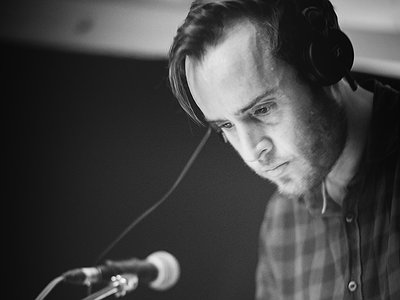Name: Stephan Packe of LTO
Nationality: British
Occupation: Musician
Current release: Daear on Denovali
If you enjoyed this interview with Stephan Packe of LTO visit his website www.stephenpacke.com
My first studio was my student bedroom containing a refurbished desktop PC running Cubase SX with a Creative Labs Audigy Sound Blaster soundcard and Roland XP-60 workstation keyboard. Native Instruments Guitar Rig has featured extensively throughout my latest album Daear. I use its Roland Space Echo emulator all the time. Anything that adds that tape warble and saturation is a winner for me. I also use its amp and cabinet models to run things such as piano, strings, synths and drums through. I love the textures and warmth they add. In terms of synths, Arturia's Analog Lab 2 suite has become my all-time favourite. Its Minimoog and Oberheim SEM emulations feature on a couple of tracks on Daear. I do actually own a Dave Smith Prophet 08 which also makes an appearance.
My hammered dulcimer which I picked up 2nd hand from Hobgoblin Music in Bristol also features on a couple of tracks. I love to involve acoustic instruments and sound sources as much as I can. I love the feel and sound of the hammers bouncing on the strings. Although I mostly work 'in the box', I've always valued physicality in making music so have been through various MIDI controllers over the years, such as the Kenton Spin Doctor (knobs), M-Audio Trigger Finger (pads and knobs), Behringer BCF2000 (faders and buttons) and Behringer FCB1010 (foot pedals). Along with my Roland RD-300SX digital piano, the Ableton Push is currently my main interface. I love the feel of its encoders, the LCD and the ribbon controller.
~
When there's a specific sound I hear in other people's music that inspires me to introduce it to my own pallet. Early on I became obsessed with the qualities of tape degradation and unstable analogue synths, listening to Boards of Canada and Tim Hecker amongst others, this led me to be constantly on the look-out for tools that create these kinds of textures.
~
If I am lacking some inspiration, I like to dedicate some focussed time to really getting to know a particular piece of gear. I'll get the manual out and go through that thoroughly and then watch some Youtube tutorials and demos to see how other people are using it. I then like to push the boundaries and experiment with using the gear in less conventional and restrained ways to see what interesting results I can squeeze out of it.
~
I got into music production at the start of the 00's, just as computers and soundcards had become powerful enough to generate complex audio in real-time, so that you no longer needed racks of expensive hardware to create and produce professional sounding music. This shift has meant that more and more people than ever can access these tools, increasing competition and, in turn, has lead to more innovation and artistry in the field than ever before. On the flip side, there is now less importance placed on technical ability in playing an instrument or using your ears (mixing), as you can use technology to 'cheat'. But you could also argue that the time freed up from these tasks can now be spent exploring other things.
~
Having a better understanding of mixing and EQ has had a major impact on how I choose and arrange different sounds compared to 10 years ago. I used to throw loads of different layers into a mix without much regard to which frequencies they occupy. Nowadays I'm trying to keep things much more minimal and be more selective about my sound selection as well as mixing as I go.
~
I suppose it's still a form of creativity even if it's coming from machines. I don't see why we can't incorporate AI more into the music creation process if it helps us create pleasing results. It's not something I've explored yet apart from using randomisation algorithms in Ableton. I wonder if it will get to a point where there's pressure on artists to credit any considerable AI contribution to their work. I suppose it's not much different to using loop libraries.
Regarding co-authorship, I suppose you could argue that the makers of the instruments and tools a musician uses are co-authors of the music as they've enabled those sounds to exist. The musician just organises and manipulates them. As long as I still feel like I'm having a considerable creative input then yeah, I can see the potential for deeper forms of Artificial Intelligence. It would be like being in a band with robots I guess. I've been curious for a long time whether tools that involve more of the physical body in music-making like body suits or video tracking will take off in the mainstream. I imagine part of the resistance is looking like a twat on stage. I'm still waiting for the technology that enables us to create any sound simply by imagining it.
Interviews / About
Stephan Packe of LTO about Gear and Authorship
"I'm still waiting for a technology that enables us to create any sound simply by imagining it."

"...there is now less importance placed on technical ability in playing an instrument or using your ears (mixing), as you can use technology to 'cheat'. But you could also argue that the time freed up from these tasks can now be spent exploring other things."
